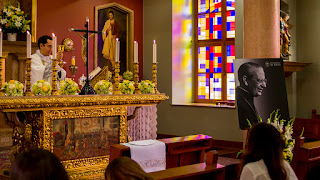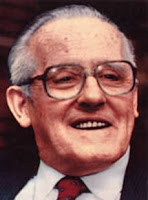The two times I was in Peru , I attended daily Mass (when in Piura
 |
| Chapel in Piura- Photo to right of St. Josemaria |
I recently came across a couple who are being considered for canonization and the sister of the husband is also in the works for sainthood. Imagine three from the same clan! All were very involved in Opus Dei.
VENERABLE EDUARDO ORTIZ de LANDAZURI's Cause of Canonization was opened in 1998. He was a prestigious doctor and university teacher in Spain and helped begin the University of Navarra Hospital in Pamplona
During the Spanish Civl War (1936-1939), his father was condemned to death by the anti-Catholic government. He and his mother and sister spent the night with his father before he faced the firing squad. Later, referring to those days, he said that they had been the most painful days of his life. The event left a deep mark on his soul and was the start of a profound spiritual crisis, the beginning of his inner conversion to God
Eduardo (1910-1985) met his future wife (Venerable) Laura Busca(next Blog) in 1935, when both were working at the King's Hospital in Madrid Spain
Due to the war years in Spain
On June 1, 1952, he asked for admission to Opus Dei. His contact with the Work meant the start of a serious struggle for continual improvement in his Christian life following the way opened by the holy life and teachings of St Josemaria Escriva, a person he came to love greatly.
As he grew in the spiritual life and his relationship with Christ, his professional life grew as well. People always found him serene and cheerful, even when faced with serious difficulties or in moments of tiredness. He worked exceptionally hard, starting each day with prayer and the Mass.
In Opus Dei he learned the value of fostering a unity of life. He came to see that the care of his family, his study and work, his interaction with friends, colleagues and students should all be deeply influenced by his faith. He found in each activity, done carefully and with order, a way to draw closer to God; it was the offering of his life, turning it into true contemplative prayer.
He showed great care for his colleagues and assistants. For his students he was a teacher and guide not only in professional matters but also in personal ones. He was friendly with everyone and tried to make himself always available. But at the same time he was demanding both on himself and on others because he wanted the talents he and they had received to be used for God’s glory.
Patients found him a true friend, for he paid attention to every aspect of their life to help them attain both bodily and spiritual health.
He retired from teaching in 1983 when he was 73 years old and was soon diagnosed with a tumor on the pancreas. Surgery showed the cancer too extensive for recovery.
From the very beginning Eduardo was aware of the seriousness of his illness and he accepted it, uniting himself ever more completely with Christ’s sufferings on the Cross and offering his life for the Church. In the last two years of his life he kept up his professional contacts, eager to bring many souls to God.
On May 1, 1985, he was brought to the University Clinic at
His reputation for sanctity quickly spread after his death, a reputation that many people had appreciated even in his lifetime, and every day more and more people ask him to intercede for them with God.


